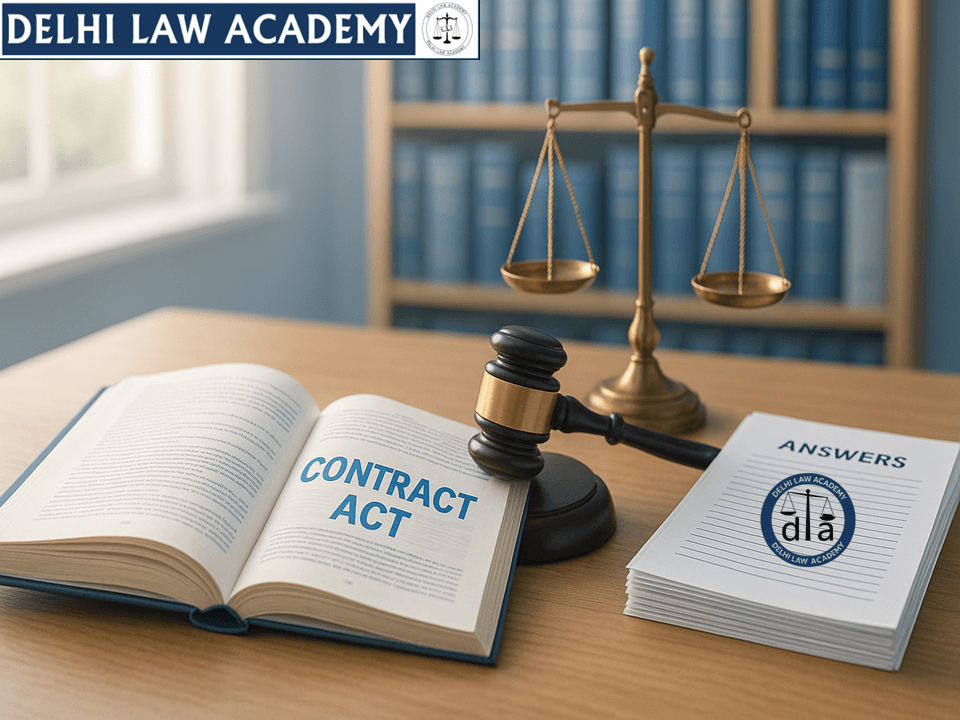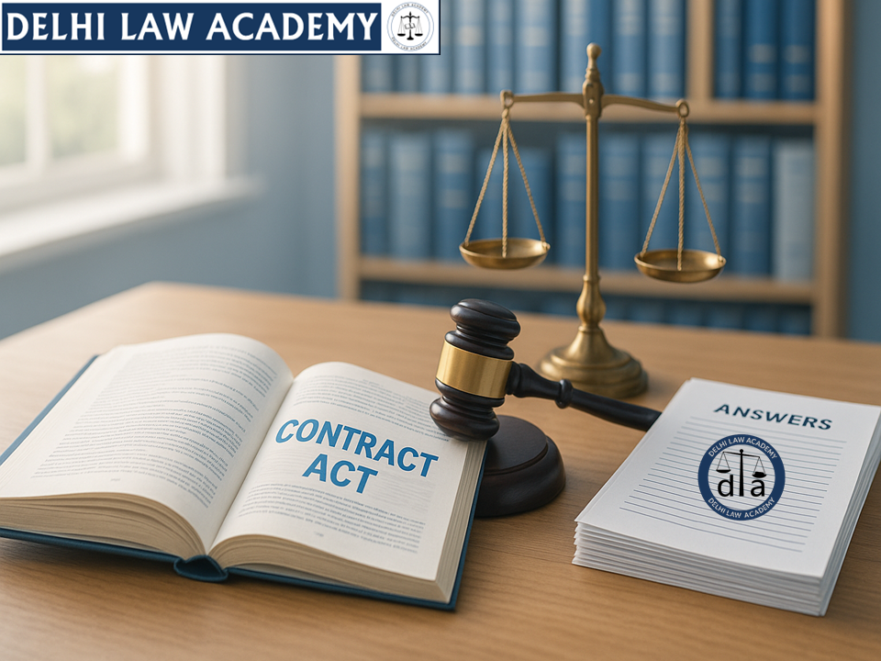
📜 The Indian Contract Act 1872: Section 16
⚖️ CASE 1
Privy Council Judgment on section 16; unconscionableness of bargain
Raghunath Prasad v. Sarju Prasad [1923 PC]
The suit is for recovery of the principal and interest due by the appellant [borrower] to the respondents [plaintiff, lender] under a mortgage of May 27, 1910.
📝 Terms of the mortgage deed
“I promise that I shall pay interest on the said date at the rate of 2 per cent per mensem on the 30th Jeth of each year. In case of non-payment of annual interest, interest will be calculated on the principle of compound interest.”
🔍 Analysis of the terms
There can be no question that these terms were high : if payment was not made the sum due on the mortgage would speedily mount up.
By the decree of the High Court, it is seen that the original debt of Rs. 10,000 had reached, with interest and costs calculated up to May 8, 1921, more than a lac of rupees—namely, Rs.112,885.
📖 Analysis of section 16 by the Privy Council
In the first place, relations between the parties to each other must be such that one is in a position to dominate the will of the other.
Once that position is substantiated, the second stage has been reached – namely, the issue whether the contract has been induced by undue influence.
Upon the determination of this issue a third point emerges, which is that of the onus probandi. If the transaction appears to be unconscionable, then the burden of proving that the contract was not induced by undue influence is to lie upon the person who was in a position to dominate the will of the other.
Error is almost sure to arise if the order of these propositions be changed. The unconscionableness of the bargain is not the first thing to be considered. The first thing to be considered is the relations of these parties? Were they such as to put one in a position to dominate the will of the other?
⚖️ Application of the law to the facts of this case
The borrower in the present case was sui juris; had full power of bargaining and of burdening his estate, his estate was not under the Court of Wards, and he lay under no disability.
With regard to his helplessness, nothing is proved except the bare fact that he, being a man of wealth as owner of one-half of certain joint family property, wished to obtain and did obtain certain moneys on loan.
The only relation between the parties that was proved was simply that they were lender and borrower. It has not been proved –it has not even been attempted to be proved – that the lender was in a position to dominate the will of the borrower.
Eventhough the bargain had been unconscionable, a remedy under the Contract Act does not come into view until the initial fact of a position to dominate the will has been established. Once that fact is established, then the unconscionable nature of the bargain and the burden of proof on the issue of undue influence come into operation.
In the present case, these stages are not reached.
📜 The Indian Contract Act 1872: Section 16
⚖️ CASE 2
Supreme Court Judgment on section 16; unconscionableness of bargain
Subhas Chandra v. Ganga Prasad [1967 SC]
📝 Suit details
Plaintiff filed a suit for declaring that a deed of settlement executed by the plaintiff’s father in favour of plaintiff’s brother’s son registered on July 22, 1944 in respect of properties situated in village Lokepur was fraudulent, collusive and invalid and for cancellation of the said document.
📖 Facts of the case
Plaintiff’s father Prasanna Kumar owned certain lands in two villages, Parbatipur and Lokepur. Prasanna Kumar died in January or February, 1948 when he was about 90 years of age. He had two sons, Ganga Prasad the plaintiff and Balaram, and an only grandson Subhash Chandra. Ganga Prasad had no son.
The deed of gift shows that the transaction was entered into out of natural love and affection of the donor for the donee and for the respect and reverence which the grandson bore to the grandfather.
What are the essential ingredients of undue influence and how a plaintiff who seeks relief on this ground should proceed to prove his case and when the defendant is called upon to show that the contract or gift was not induced by undue influence?
The instant case is one of gift but it is well settled that the law as to undue influence is the same in the case of a gift inter vivos as in the case of a contract.
⚖️ Principles for courts
A court trying a case of undue influence must consider two things to start with:
- (1) are the relations between the donor and the donee such that the donee is in a position to dominate the will of the donor?
- (2) has the donee used that position to obtain an unfair advantage over the donor?
Sub-section (2) of the section is illustrative as to when a person is to be considered to be in a position to dominate the will of another. Generally speaking, the relation of solicitor and client, trustee and cestui que trust, spiritual adviser and devotee, medical attendant and patient, parent and child are those in which such a presumption arises.
Sub-section (3) throws the burden of proving that a contract was not induced by undue influence on the person benefiting by it when two factors are found against him:
- he is in a position to dominate the will of another and
- the transaction appears to be unconscionable.
📚 Halsbury’s Laws of England
“there is no presumption of imposition or fraud merely because a donor is old or of weak character…….There is no presumption of undue influence in the case of a gift to a son, grandson or son-in-law, although made during the donor’s illness and a few days before his death.”
🔍 Findings
There was practically no evidence about the domination of Balaram over Prasanna at the time of the execution of the deed of gift or even thereafter.
The circumstances obtaining in the family in the year 1944 do not show that the impugned transaction was of such a nature as to shock one’s conscience.
The plaintiff had no son. He had been making a living elsewhere. He owned a jungle in his own right and was therefore possessed of separate property in which his brother or nephew had no interest. There were other joint properties in the village of Parbatipur which were not the subject-matter of the deed of gift.
The circumstance that a grandfather made a gift of a portion of his properties to his only grandson a few years before his death is not on the face of it an unconscionable transaction. Moreover, we cannot lose sight of the fact that if Balaram was exercising undue influence over his father he did not go to the length of having the deed of gift in his own name.
In this he was certainly acting very unwisely because it was not out of the range of possibility that Subhas after attaining majority might have nothing to do with his father.
📚 Continue Your Contract Act Preparation
Don’t stop here! Strengthen your knowledge of the Contract Act with our other fully solved tests:
📘 Free Study Material for Judiciary Aspirants!
Download our FREE study material prepared by Delhi Law Academy’s expert faculty.
❓ Frequently Asked Questions: Section 16 of Indian Contract Act
Section 16 deals with undue influence. It explains situations where one party is in a position to dominate the will of another and how contracts or gifts induced by such influence can be challenged.
An unconscionable bargain is a transaction that is so unfair that it shocks the conscience of a reasonable person. Section 16 considers such transactions when undue influence is suspected.
To prove undue influence:
1️⃣ Show that one party was in a position to dominate the will of the other.
2️⃣ Demonstrate that this position was used to gain an unfair advantage.
3️⃣ If the transaction appears unconscionable, the burden of proof shifts to the dominating party.
Yes ✅. The law of undue influence applies equally to gifts inter vivos as it does to contracts. Courts assess the same principles to determine whether a gift was induced unfairly.
No. According to Halsbury’s Laws of England and case rulings, being old, wealthy, or of weak character does not automatically imply undue influence. Evidence of domination and unfair advantage must be shown.
If a transaction is shown to be unconscionable and one party is in a position to dominate the other’s will, the burden of proving that the contract or gift was not induced by undue influence rests on the dominating party.
Contact us
📍 Delhi Law Academy – Jaipur Branch
6C, Tower 2, Coaching Hub, Pratap Nagar, Jaipur – 302033
📞 Phone:
+91 9911916552
+91 8447285606
✉️ Email:
contactus@delhilawacademy.com

